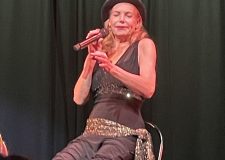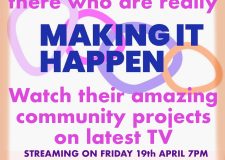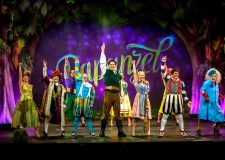Interview: Roots manoeuvre

Movie star, insurance salesman and comedian, Omid Djalili returns with a new tour. He talks to Victoria Nangle about dancing, Twitter, and the serious business of comedy
So, what brings you back to stand up after three and a half years away?
“Very good question, it was the love of it, surely. And the opportunity to evolve as a human being. I believe – no seriously – I really believe if you take it [comedy] seriously in a holistic way, so you work on yourself while you’re doing it, you work on your material, you work on your messages and you work on the structure of the piece, then it’s the one art form where you can transform actually as a human being, and I felt I needed to do that. I’m doing it in the most holistic way, I’m even doing therapy so I can develop within myself while I’m doing it. I’ve not even revealed this in any other publication. Maybe it’s because it’s for Brighton. The people understand therapy.” [laughs]
That’s very disciplined of you….
“People are very evolved in Brighton, I think they would understand that. I want my audiences to know I’m trying to evolve with them, by taking a more holistic view. People don’t rate stand up as an art form and I think it’s the most – one of the most difficult things to do. But I’m trying to do it well.”
When comics get to the point where they’re as respected as you are, sometimes they are less disciplined…
“Yes, yes, very good point, that’s so true. ‘Cos you think that the older you get, the more it’s likely you can knock something out but actually if you see you’ve evolved, as I’ve evolved as a person, and you realise how difficult it is and actually take it to another level it becomes even more hard work. So I think it’s a question of trying to stretch myself really. You always want to do something better than what you did before.”
When I’ve seen you before you’ve played on people’s preconceptions but you’ve got such a profile these days that the preconceptions aren’t there so much…
“No they’re not, yeah. It used to just be a bloke come off the boat from the Middle East [laughs] and he’s kind of really funny – what is this? And I think that he said surprising things about our culture. And so I think that I can’t do that anymore. There’s a little nod to it at the beginning of the show, a nod to what got me there in the first place, you know. He still goes on about ethnicity –
well I do! But not as much. I think that someone on Twitter said to me; ‘Oh, I don’t like Omid Djalili ‘cos he keeps going on about Iran,’ so I wrote back, ‘I swear on the life of Ahmed, I don’t do that anymore!’ [laughs] And then, I think that it’s important for people to know that I can’t let go of everything. It’s like telling a climber, well, you’re gonna climb that mountain and not use your usual equipment. We want to see you climb up that mountain with your tongue! It’s like saying that, you know? So it doesn’t make sense. You have to do little bits of what got you there in the first place. But while you’re doing that you need to evolve and transform as well. I wasn’t even supposed to dance on this show! But by popular demand and death threats, I’ve had to put in some kind of dance routine at the end. I just thought I’d be funny. I spin on my belly now, I tried to break dance and they laughed. That’s kind of what I can do, that break-dancers can’t do, is spin on my belly. It’s a new fat man trick that no-one can do, and it brings the house down.” [laughs]
You’ve straddled several cultures at once and the only other comic that’s got Iran and Britain clearly is Shappi Khorsandi. Why do you think there don’t seem to be many Persian comics?
[Pauses] “It takes time… I was one of the first to do it back in what, ’93, ’94 when I started. You see, I was born and raised in London. I’m 46 now, but my family is the longest standing Iranian family in Britain. So, I think that even Shappi Khorsandi’s family came over in the late ’70s, or even early ’80s, I’m not sure. My family has been in Britain since the ’50s, so I suppose it would have to be someone like me, to come from the type of family that I come from, to be the first. But I know in America there is a range of Iranian comedians doing well, Maz Jobrany is very well respected and has a high profile in America now but it takes a long time to actually get… good, you know?”
You’ve got quite a presence on American TV. How do they perceive your comedy and roots?
“Well basically I got a deal with NBC back in 2003 and they said we’ve been looking for someone like you, who doesn’t shy away from his Middle Eastern roots. I think they were talking about a number of comedians in America who are very well known, but who’ve changed their names and they don’t talk about their roots. I mean, John Belushi for example was Albanian but you never would have known that because he’s American and that wasn’t a big deal for him. His Albanian roots were just not a big deal. I think they were looking for someone who understood how the West works but wasn’t shying away from talking about Middle Eastern issues, and so that’s probably why I fit the bill. I think they said that they’ve been looking for someone like that for 20 years.”
You’ve played Fagin on the West End stage, a slave trader in Gladiator, a born again Jew in The Infidel. Which role would you really like to play in the future?
“Well, that’s a good question because I’d never thought about playing Fagin before so that was very leftfield, that really took me by surprise. What I would love to do is play Al Pacino’s son.
Al Pacino’s rotund son. Who he’s really embarrassed of, in some film where you know he’s got some kind of… I know he wants to do some kind of comedy. Al Pacino was a stand-up comedian and a comedy sketch person before he became a serious actor and I’m hoping that like Robert De Niro, he’ll come back to his comedy roots as he gets older and I want to play his mid 40s, kind of, lost illegitimate son.” [laughs]
Omid Djalili – Tour Of Duty Show, Theatre Royal Brighton, Wednesday 15 February 2012, 8pm, £20, www.atgtickets.com




















